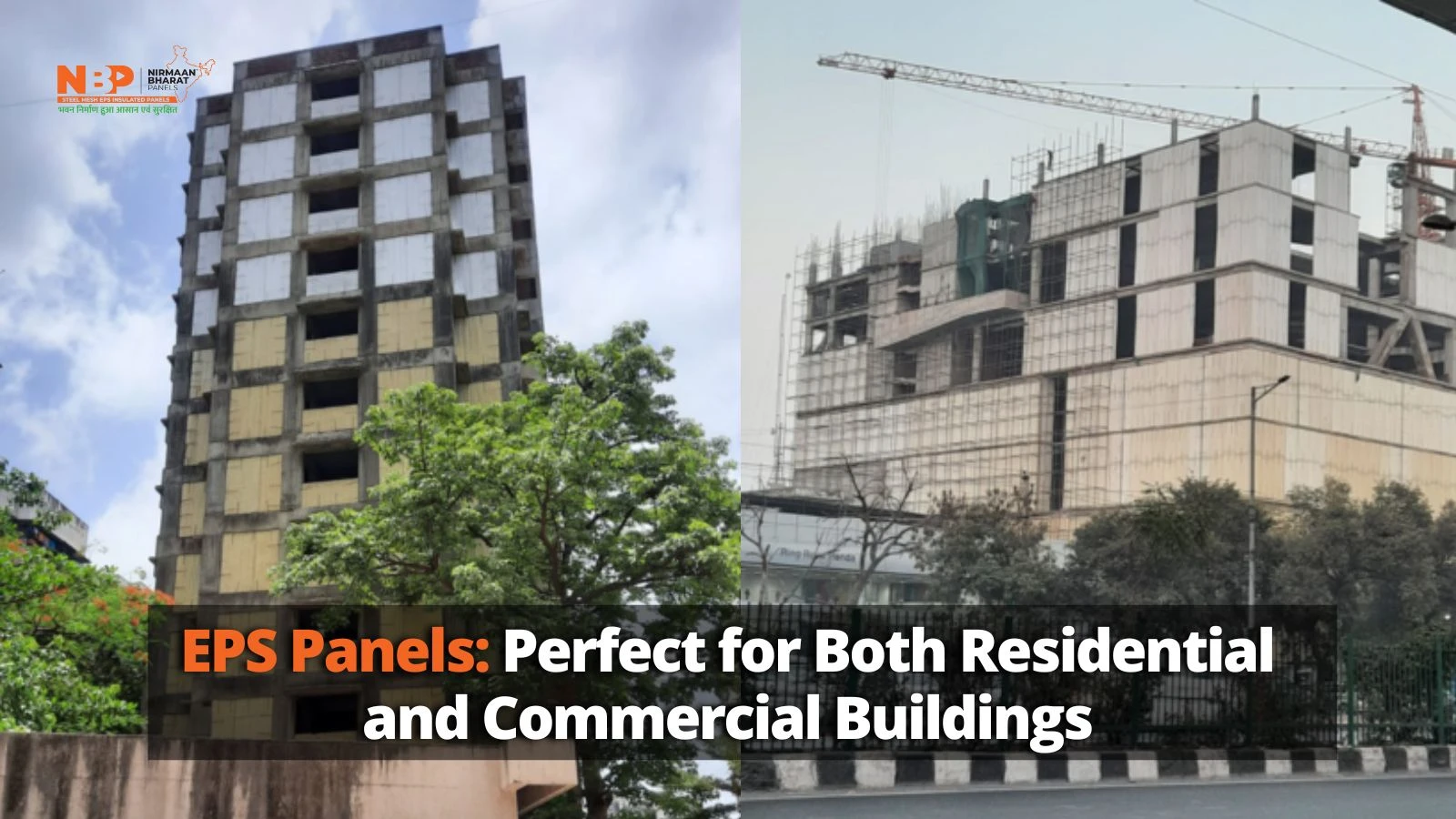In the ever-evolving construction industry, efficient and cost-effective building materials play a crucial role in ensuring structures are both durable and sustainable. One such material that has gained significant popularity over the years is Expanded Polystyrene (EPS) panels. With their lightweight, thermal insulation properties, and ease of installation, EPS panels are increasingly being used in both residential and commercial buildings. This blog explores why EPS panels are the ideal choice for modern construction, their benefits, and how they are transforming the way we think about building materials.
Table of Contents
ToggleWhat Are EPS Panels?
EPS, or Expanded Polystyrene, is a lightweight material made from polystyrene beads that expand when heated and fused. The process creates a foam-like material that is highly resistant to heat, moisture, and impact. EPS panels are typically made by sandwiching EPS foam between two layers of cement or fibre-reinforced board. The panels are designed for use in walls, floors, roofs, and facades, offering an excellent combination of insulation, structural integrity, and ease of installation.
Key Features of EPS Panels
Before delving into the specific uses of EPS panels in residential and commercial applications, it’s important to understand the key features that make them such an attractive option for construction projects:
1. Lightweight and Strong
EPS panels are much lighter than traditional concrete or brick materials, making them easier to handle and install. Despite their lightness, EPS panels are incredibly strong and durable, capable of withstanding heavy loads and harsh environmental conditions.
2. Thermal Insulation
A notable characteristic of EPS panels is their remarkable ability to provide thermal insulation. They help maintain a comfortable indoor temperature by preventing the transfer of heat between the interior and exterior of the building. This advantage is especially significant in areas experiencing extreme temperature variations. EPS panels for residential and commercial buildings offer superior thermal insulation that significantly reduces the need for air conditioning or heating.
3. Sound Insulation
In addition to thermal insulation, EPS panels also offer soundproofing qualities. They can help reduce the transmission of noise between rooms, making them a great choice for both residential homes and commercial spaces where privacy and quiet are important.
4. Fire Resistance
EPS panels are highly resistant to fire, making them a safer option compared to other materials like wood or conventional foam. The fire-retardant additives in the panels ensure that they won’t catch fire easily, providing an additional layer of safety to buildings.
5. Cost-Effectiveness
EPS panels are an affordable option for builders, as they are cheaper to manufacture and install than traditional building materials like bricks or concrete. Additionally, their thermal insulation properties help reduce heating and cooling costs over the long term.
6. Sustainability
EPS panels are made from recyclable materials and are often used in green building projects. Their energy-efficient properties contribute to reducing the environmental impact of a building’s energy consumption, making them a sustainable choice for eco-conscious builders and homeowners.
EPS Panels in Residential Construction
The use of EPS panels in residential construction has been steadily increasing due to their wide range of benefits. Here’s how these panels can enhance the quality, energy efficiency, and overall performance of homes:
1. Energy Efficiency and Comfort
In residential buildings, energy efficiency is a top priority. EPS panels for residential and commercial buildings offer superior insulation properties, helping to maintain a comfortable indoor temperature throughout the year. In winter, the panels prevent heat loss, while in summer, they help keep the interior cool by blocking out the heat. This reduces the need for air conditioning and heating, lowering energy consumption and costs for homeowners.
2. Quick and Easy Installation
The lightweight nature of EPS panels makes them easy to transport and install, reducing the time required for construction. This is especially beneficial in residential projects where timely completion is important. The ease of installation also translates to lower labour costs, which can significantly reduce the overall cost of construction.
3. Improved Sound Insulation
For homeowners looking for peace and privacy, EPS panels offer excellent sound insulation. Whether it’s preventing noise from outside or reducing the transmission of sound between rooms, EPS panels create a quieter and more peaceful living environment.
4. Enhanced Durability
Homes built with EPS panels are highly durable and resistant to damage from weather, pests, and moisture. The panels are resistant to rot, mold, and mildew, which can be common problems in traditional homes. Additionally, they are capable of withstanding extreme temperatures and other environmental factors, ensuring the longevity of the home.
5. Customization and Aesthetic Appeal
EPS panels can be easily customized to meet the specific design and aesthetic preferences of homeowners. Whether it’s a modern, contemporary look or a more traditional design, EPS panels can be coated or finished to match the desired style. The panels can also be used to create unique architectural features, such as intricate facades or curved walls.
EPS Panels in Commercial Construction
The benefits of EPS panels extend beyond residential applications, making them an ideal choice for commercial buildings as well. Here’s how EPS panels can enhance the performance and functionality of commercial spaces:
1. Cost-Effective for Large-Scale Projects
Commercial construction projects, particularly large-scale developments, require materials that are both cost-effective and durable. EPS panels for residential and commercial buildings offer an affordable solution for constructing office buildings, shopping centres, warehouses, and more. Their lower material and labour costs, combined with their long-term energy savings, make them a cost-effective choice for commercial developers.
2. Sustainability and Green Building
In today’s commercial construction market, sustainability is a key concern. EPS panels are often used in green building projects due to their energy-efficient properties and recyclable materials. The panels help reduce the carbon footprint of commercial buildings by improving their thermal insulation and minimizing the need for heating and cooling.
3. Speed of Construction
Time is money in the commercial construction industry, and EPS panels can significantly reduce the time required to complete a building. Since the panels are lightweight and easy to install, commercial projects can be completed more quickly, allowing developers to meet deadlines and get their properties to market faster.
4. Customization for Commercial Use
EPS panels can be tailored to suit the specific requirements of commercial buildings. Whether it’s for office spaces, retail stores, or industrial facilities, EPS panels offer flexibility in design and functionality. The panels can be used in walls, ceilings, floors, and even exterior facades, offering a wide range of possibilities for architects and developers.
5. Fire Safety
Fire safety is a critical consideration for commercial buildings, especially in high-rise structures. EPS panels provide excellent fire resistance, helping to prevent the spread of fire and ensuring the safety of the building’s occupants. This is particularly important for office buildings, hospitals, schools, and other commercial spaces where large numbers of people are present.
6. Maintenance and Longevity
EPS panels are highly durable and require minimal maintenance. Commercial buildings often face the challenge of maintaining their structures over time, but EPS panels are resistant to weathering, corrosion, and damage from environmental factors. This makes them an excellent long-term investment for commercial properties, reducing the need for repairs and maintenance.
Applications of EPS Panels in Residential and Commercial Buildings
EPS panels are versatile and can be used in a variety of applications, both in residential and commercial construction:
- Walls: EPS panels are commonly used for external and internal walls, providing excellent thermal and sound insulation.
- Roofing: The panels can be used in roofing systems to provide insulation and enhance the energy efficiency of the building.
- Floors: EPS panels are ideal for use on floors, offering thermal insulation while reducing the weight of the overall structure.
- Facades: EPS panels are often used in facades for their aesthetic appeal and ability to create a unique exterior design.
- Insulation Boards: EPS panels can be used as insulation boards in walls, roofs, and floors to improve the overall energy efficiency of the building.
Conclusion
EPS panels have emerged as one of the most efficient, cost-effective, and versatile materials in modern construction. Whether used in residential homes or large commercial buildings, these panels offer numerous benefits, including thermal insulation, soundproofing, fire resistance, and ease of installation. With their lightweight nature, durability, and environmental sustainability, EPS panels for residential and commercial buildings are reshaping the future of construction, offering both builders and property owners a reliable solution for creating energy-efficient, safe, and aesthetically pleasing buildings.
For those looking to build smart, sustainable, and cost-effective structures, EPS panels are the clear choice. At Nirmaan Bharat Panels, we provide high-quality EPS panels that cater to both residential and commercial needs. Our products are designed to meet the highest industry standards, ensuring that your construction project is a success from start to finish.



